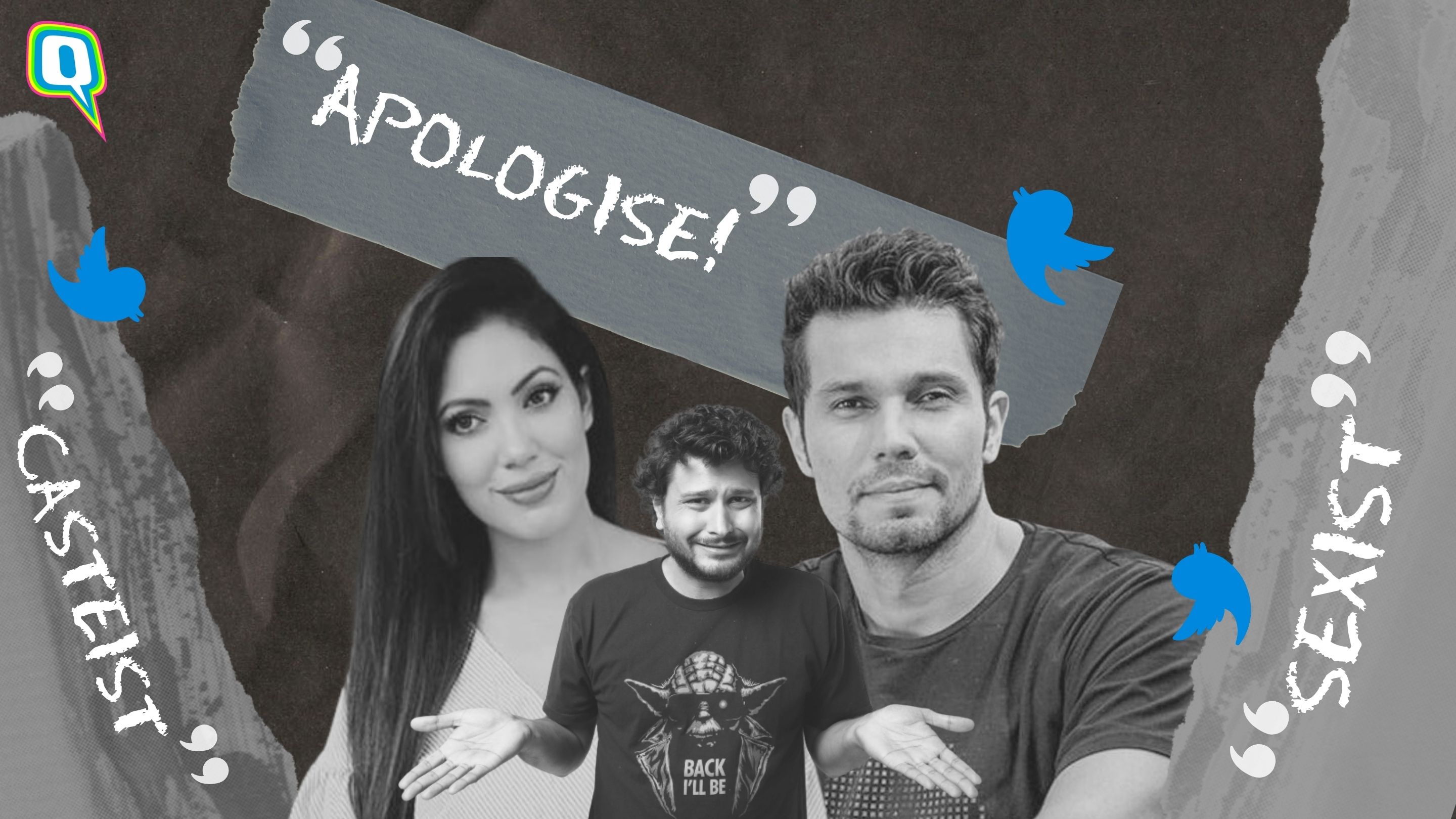(Trigger Warning: Casteist Slurs, Sexist Remarks)
“I can’t believe someone’s been there twice,” said Randeep Hooda while referring to Mayawati’s children in an extremely sexist, casteist, and overall irresponsible statement a few years ago at an event.
Neville Shah, a stand-up comedian, recently apologised for a joke he made in a 2016 show where he is seen mocking the quota system. In the one-minute clip of the show that made the rounds on Twitter, Shah talks about a visit to his doctor and questions the doctor’s competency when he draws a Venn diagram instead of a kidney. He goes on to reason his doctor’s incompetency by alleging that he might have come from the quota system.
Actor Munumun Dutta, known for her role as Babita in the famous TV show Taarak Mehta Ka Ulta Chashma also came under the radar for talking about her appearance in a vlog, and saying that she ‘does not wish to look like a bh*ngi’. She issued an apology too. Soon after, Yuvika Choudhary also used the same word and was called out again for her insensitivity, which she too, followed with an apology.
The list goes on and on.
Even though these might be completely separate instances of casteism, there is one thing common among all of them. The people who made these statements and supposed jokes got away with them for almost nothing (the exception being Munmun Dutta, against whom a complaint was lodged and she was booked under the Scheduled Castes and Tribes (Prevention of Atrocities) Act).
So, how do these people get away with it? Is it really that easy to be casteist in India? Turns out, it is. And we've cracked the code on how to do it:
Step 1: The Statement
Very obvious, actually. Make a ridiculous casteist comment. Mask it as a joke or a lighthearted comment so that if you get called out in the future, you can tell people they’re being a “buzzkill” for ruining your joke. Also, don’t forget to make it sound witty, so much so that it reeks of your upper-class privilege and arrogance.
Step 2: Move On
Sometimes, you'll find that even though your statement is receiving flak online and the internet is demanding accountability, you can just ignore them all and get away with it scot-free! Just don't issue an apology, don't show any remorse, and everyone will forget about it.
But don't worry, if this doesn't work, we've still got you.
Step 3: The Apology
If you’ve reached this step, you’re probably in trouble, since you, in fact, have been called out. But don’t worry, your savarna shield will very much protect you from any severe repercussions. Try to be as emotional as possible in your apology and say that you accept your mistake and are not making an excuse for your behaviour. Follow this with two long paragraphs of statements, that, in fact, are excuses.
Step 4: Flaunt Your Ignorance
Say something like “I didn’t know what this word actually meant” to prove how truly ignorant you are towards caste atrocities in India. It doesn’t matter if accepting you didn’t know the meaning of the word is actually worse, since that is how far up you are in your bubble of privilege.
Step 5: Use the Evergreen “Raat Gayi, Baat Gayi” Excuse
Claim that you aren’t wrong anymore since the statement was made years ago. After all, there is an expiration date on being called out for your actions, right? It’s been quite a few years since you said it, so it’s safe to assume that the hurt you caused has been magically repaired.
Step 6: Say You Were Misunderstood
You’ve come so far in your apology and said a lot of things other than actually apologising. So, why not add some ‘I was misunderstood’ to the mix, just for some bonus sympathy points? After all, words like bh*ngi have two meanings, right? And you obviously meant it in a good way…
Even after all this, at the most, a complaint will be lodged against you, or possibly even a laughable fine, that you will pay off without so much as batting an eyelid. As far as the social media outrage goes, you’ll face some backlash, but hey, there’s an upside to that too - you get to stay in the news for longer, and the fact that you paid a fine will trigger a whole new set of headlines once again.
In India, this lack of accountability from celebrities and media personalities not only shows how we can repeatedly and casually brush issues of caste under the rug, but also portrays our lack of sensitivity and knowledge regarding the subject. We have failed to even educate ourselves on the issue, and have in a way enabled these atrocities against Dalits.
What’s appalling is that casteism in India is a much older custom than slavery, and yet, we have managed to turn a blind eye towards it. These slurs have been so deeply entrenched in our vocabulary that we don’t think twice before casually using them. There is no malice in our intentions, but that does not qualify as a valid excuse, not in 2021.
It is upon the savarna population to educate themselves on these issues, and even more so for the people (celebrities, influencers) that have a platform that reaches thousands and millions of people. As far as celebrities go, we get it. You made a mistake. But giving a half-hearted apology, riddled with excuses for your behaviour will only feed the fire. Instead, taking cognisance of your privilege and acknowledging that you were in the wrong is something that, in my opinion, would make a better case.
(Update: After his offensive statement, Actor Randeep Hooda has been stripped off his ambassadorship of the Convention for the Conservation of Migratory Species of Wild Animals (CMS) — an environmental treaty of the United Nations. A statement and/or apology from Hooda is still awaited).
